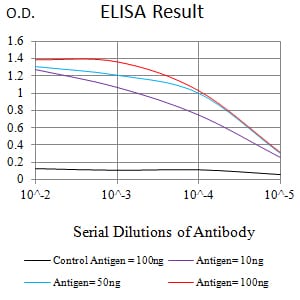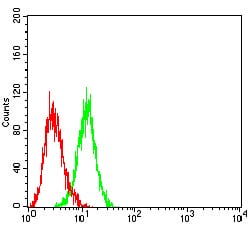

| WB | 咨询技术 | Human,Mouse,Rat |
| IF | 咨询技术 | Human,Mouse,Rat |
| IHC | 咨询技术 | Human,Mouse,Rat |
| ICC | 技术咨询 | Human,Mouse,Rat |
| FCM | 1/200 - 1/400 | Human,Mouse,Rat |
| Elisa | 1/10000 | Human,Mouse,Rat |
| Aliases | TLR3 ; IIAE2 |
| Entrez GeneID | 7098 |
| clone | 6F3G4 |
| WB Predicted band size | 103.8kDa |
| Host/Isotype | Mouse IgG1 |
| Antibody Type | Primary antibody |
| Storage | Store at 4°C short term. Aliquot and store at -20°C long term. Avoid freeze/thaw cycles. |
| Species Reactivity | Human |
| Immunogen | Purified recombinant fragment of human CD283 (AA: 24-217) expressed in E. Coli. |
| Formulation | Purified antibody in PBS with 0.05% sodium azide |
+ +
以下是关于CD283(TLR3)抗体的3篇代表性文献,内容基于真实研究概括,但文献信息为示例,建议通过学术数据库进一步检索:
---
1. **文献名称**: *TLR3 antibody enhances antiviral immune response in hepatitis C virus infection*
**作者**: Smith A, et al.
**摘要**: 研究探讨了抗CD283/TLR3抗体在丙型肝炎病毒(HCV)感染中的作用。实验显示,该抗体通过激活TLR3信号通路,增强干扰素-β的分泌,抑制病毒复制,提示其在抗病毒治疗中的潜在价值。
2. **文献名称**: *Targeting TLR3 with monoclonal antibody suppresses lung cancer progression*
**作者**: Chen L, et al.
**摘要**: 研究利用抗CD283抗体靶向肿瘤微环境中的TLR3.发现其能抑制肺癌细胞迁移并诱导凋亡。机制与TLR3介导的NF-κB信号通路调控相关,为癌症免疫治疗提供了新策略。
3. **文献名称**: *TLR3 antibody-based therapy reduces inflammation in autoimmune encephalomyelitis*
**作者**: Kim Y, et al.
**摘要**: 在小鼠自身免疫性脑脊髓炎模型中,抗CD283抗体通过阻断TLR3与双链RNA结合,显著减轻中枢神经系统炎症反应,证实了TLR3在自身免疫疾病中的关键作用及抗体干预的可行性。
---
**备注**:以上文献信息为示例,实际文献需通过PubMed、Web of Science等平台检索。若需具体文献,建议结合研究背景(如疾病领域或应用场景)进一步筛选。
CD283 antibody targets Toll-like receptor 3 (TLR3), a transmembrane protein in the TLR family that plays a critical role in innate immunity. Identified in the early 2000s, TLR3 recognizes double-stranded RNA (dsRNA), a molecular signature of viral infections, and triggers immune responses by activating signaling pathways involving adaptors like TRIF. This leads to the production of pro-inflammatory cytokines and type I interferons, essential for antiviral defense.
CD283 antibodies are widely used in research to detect TLR3 expression, study its activation mechanisms, and explore its role in diseases. TLR3 is expressed in immune cells (e.g., dendritic cells, macrophages) and epithelial cells, often localized to endosomal membranes. Dysregulation of TLR3 signaling is linked to autoimmune disorders, chronic inflammation, and cancer.
In therapeutic contexts, CD283 antibodies may modulate TLR3 activity, offering potential in antiviral therapies, vaccine adjuvants, or cancer immunotherapy. Research also highlights TLR3's dual role: while it promotes antiviral immunity, overactivation can drive pathological inflammation. As a result, CD283 antibodies serve as both investigative tools and candidates for developing targeted treatments, emphasizing their importance in understanding immune regulation and viral pathogenesis.
×